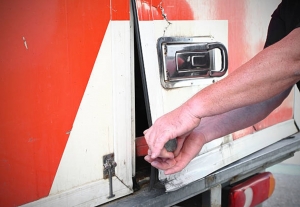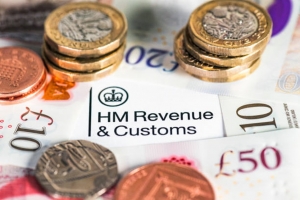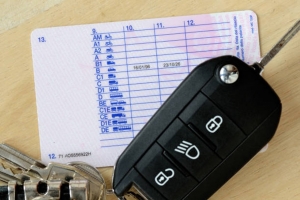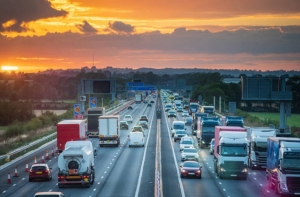Cargo Theft: Vanished Goods, High Tensions, and Ruined Curtains
Lorry drivers across the UK are urging the need for more secure truck stops to combat organised crime gangs that target their cargo. The Road Haulage Association (RHA) has called on the government to establish a specific freight crime offense and create a national truck parking security standard to address the growing issue of thefts. The scale of the problem is significant, with thousands of lorry crimes reported annually, leading to substantial financial losses and affecting the wellbeing of drivers.
Organised crime gangs are highly sophisticated, understanding supply chains, surveillance, and policing, according to the National Vehicle Crime Intelligence Service (NaVCIS). These criminals often strike at motorway service stations and truck stops on major routes, targeting valuable loads like alcohol, tobacco, and electronics. The stolen goods are then sold through various channels, including online platforms and backstreet markets, further complicating efforts to trace and recover the items.
The impact of these crimes extends beyond the immediate loss of cargo. Even attempted thefts result in costly repairs and rejected goods, contributing to increased costs that ultimately burden consumers. Some hauliers report that the threat of theft has led to significant stress among drivers, with some even leaving the profession due to the fear and anxiety caused by these incidents.
To address this issue, there is a growing call for more secure parking facilities for lorries. The British Parking Association (BPA) introduced the Park Mark Freight scheme to assess and certify truck stops with strong security measures, but only a small number of sites have met the required standards. The need for improved security at truck stops is evident, with industry stakeholders urging the government to prioritise the safety and welfare of lorry drivers.
HMRC Launches Campaign to Help Contractors Avoid Tax Avoidance Schemes
HMRC has launched a new campaign, "Tax avoidance: don’t get caught out," aimed at contractors. The campaign highlights how to identify tax avoidance schemes, warns of the risks, and explains how to report suspicious activity to HMRC. Tax avoidance occurs when individuals manipulate tax rules to pay less than they owe, but those who participate in these schemes ultimately have to pay the full tax amount, along with interest and potential penalties.
HMRC's goal is to prevent people from getting involved in these schemes and assist those who suspect they may already be entangled. By partnering with various organizations, HMRC is providing contractors with resources to better understand the dangers of tax avoidance schemes and how to avoid them.
Under UK law, everyone is responsible for paying the correct amount of tax, even if they have hired someone else to manage their tax affairs or received incorrect advice. Contractors working through agencies or umbrella companies are particularly encouraged to review their pay arrangements to avoid unexpected tax bills.
The campaign features new guidance and an interactive risk checker, helping workers determine whether their contracts could involve tax avoidance. The HMRC's Spotlights series offers examples of these schemes, including Spotlight 60, published in August 2022, which warns specifically about non-compliant umbrella companies and the warning signs to watch for.
UK Government Invests £100M in Green Aviation Technology to Drive Net-Zero Progress
The UK government has announced over £100 million in funding for five cutting-edge research and development projects aimed at reducing the environmental impact of aviation. The funding, provided through the Aerospace Technology Institute Programme by the Department for Business and Trade, will support advancements in sustainable aviation technology, including zero-emission hydrogen flight and innovative propulsion systems.
The five projects receiving this funding are led by GKN Aerospace, Queen's University, Rolls-Royce, Short Brothers, and ZeroAvia. These initiatives are set to pioneer new technologies that could significantly reduce aviation's carbon footprint and contribute to the sector's journey toward net-zero emissions.
The aviation industry is known for its challenges in decarbonisation, and these investments in green technology are seen as a vital step in reducing the reliance on carbon offsetting and carbon capture methods, which are expected to play a role in meeting the UK's 2050 net-zero target.
This funding comes alongside the UK government’s commitment to sustainable aviation fuel (SAF), highlighted by the new SAF (Revenue Support Mechanism) Bill. The investment underscores the government's dedication to accelerating the transition to a more sustainable aviation sector, positioning the UK as a leader in the development and adoption of environmentally friendly aerospace technologies.
Calls for New Driving Licence Rules to Improve Road Safety
Leading MPs and safety organizations are urging the government to implement new driving licence regulations to reduce accidents and fatalities on the roads. The Motor Vehicles (Driving Licences) (New Drivers) Bill, presented in Parliament, proposes a graduated driving licence system with cross-party support.
Under the proposed rules, newly qualified drivers would face restrictions during the first six months after passing their test. These measures aim to enhance safety for inexperienced drivers and include a zero-alcohol policy, limits on the number of passengers, and restrictions on nighttime driving.
Labour MP Kim Leadbeater, who introduced the bill, emphasised that the changes are designed to improve road safety without limiting young people's opportunities. She cited evidence that new drivers are statistically more likely to be involved in accidents during their initial months of driving. Similar schemes in other countries, such as New Zealand, have successfully reduced collisions among young drivers.
The bill has garnered support from various stakeholders, including the AA, RAC, and charities like Project EDWARD. RAC spokesperson Rod Dennis highlighted the urgent need for these changes, noting that young drivers, particularly men, are disproportionately involved in severe road accidents. The second reading of the bill is scheduled for May 17, with advocates hopeful it will pass and help save lives.
Yorkshire Operation Catches 240 Dangerous Drivers Using Unmarked HGV
During a five-day operation in Yorkshire, officers used an unmarked HGV cab provided by National Highways to catch 240 drivers engaging in dangerous behaviour on the motorway. The operation, conducted from July 14th to July 19th, focused on the M1, M18, and A1 routes. The elevated vantage point of the HGV cab allowed officers to observe drivers in both large vehicles and cars.
Among those stopped, 45 drivers were caught using mobile phones, 74 were not wearing seatbelts, 10 were not in proper control of their vehicles, and 12 were driving without due care and attention. Notable incidents included a man trimming his facial hair with tinsnips and a driver transporting livestock with a bird loose in the trailer.
Additionally, 31 drivers were penalised for stopping on the hard shoulder, two for speeding, and three for driving through a red X. Of the vehicles involved, 176 were HGVs, 41 were LGVs, and 57 were cars.
Roads Policing Inspector Matt Collings emphasised the importance of road safety, noting that this operation followed another similar effort in May. He highlighted the "Fatal 4" offenses - using a mobile phone, driving under the influence, speeding, and failing to wear a seatbelt - as leading causes of fatal and serious accidents. Collings urged drivers to take responsibility for their actions, stressing that the consequences of reckless driving could lead to severe legal repercussions.










